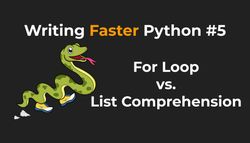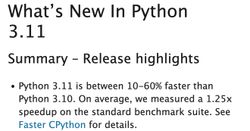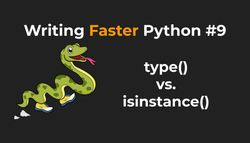map() vs. List Comprehension
From For Loop vs. List Comprehension, we already know that list comprehension is usually faster than the equivalent for loop. In the article, I also compared list comprehension with the filter() function. I concluded that, while filter() has some justified use cases where it's better than list comprehension (for example, when you want the more memory-efficient generator object that the filter() function returns), list comprehension is usually the faster choice.
About the "Writing Faster Python" series
"Writing Faster Python" is a series of short articles discussing how to solve some common problems with different code structures. I run some benchmarks, discuss the difference between each code snippet, and finish with some personal recommendations.
Are those recommendations going to make your code much faster? Not really.
Is knowing those small differences going to make a slightly better Python programmer? Hopefully!
You can read more about some assumptions I made, the benchmarking setup, and answers to some common questions in the Introduction article. And you can find most of the code examples in this repository.
What about list comprehension vs. map()? Is the map() function faster than list comprehension? And if not, does it make any sense to use it?
I've devised a simple test that compares how map() and list comprehension generate a list of squares for the first million numbers (it also sums up the squares - see the box below the benchmarks for the explanation):
# map_vs_comprehension.py
NUMBERS = range(1_000_001)
def map_lambda():
return sum(map(lambda x: x * x, NUMBERS))
def comprehension_lambda():
return sum([x * x for x in NUMBERS])Here are the benchmarks results:
$ python -m timeit -s "from map_vs_comprehension import map_lambda" "map_lambda()"
5 loops, best of 5: 44.3 msec per loop
$ python -m timeit -s "from map_vs_comprehension import comprehension_lambda" "comprehension_lambda()"
10 loops, best of 5: 36.2 msec per loopAs you can see, map_lambda() is around 20% slower than comprehension_lambda() (44.3/36.2≈1.22).
map() returns a generator
In Python 2, functions like map() or filter() returned lists. But in Python 3, they return generators, so they finish much faster.
There is no free lunch, though. Time saved during the creation of a generator is paid back when we iterate over that generator.
Generators also offer more flexibility. For example, if you only need to grab the first element, creating a generator and calling next() is much faster than creating a list and grabbing the first element with a_list[0].
In my benchmarks, I needed to make sure that both functions did the same amount of work. I could call list(map(...)) to convert a generator to a list, but that would add additional work to the map_lambda() function that the list comprehension doesn't have to do:
def map_lambda():
return list(map(lambda x: x * x, NUMBERS))
def comprehension_lambda():
return [x * x for x in NUMBERS]map_lambda() takes around 47.7 milliseconds to run and comprehension_lambda() takes around 29.8 milliseconds. With list(map(...)) being 60% slower than list comprehension, I felt those benchmarks would not be objective enough.
Instead, I decided to simulate calling another function on the results of a list and a generator. That would force both functions to iterate over all the items. sum() seemed like a good, simple function to achieve that.
Named function
Could the lambda function in map() be the reason why this function is so slow? Let's create another benchmark where we use the math.sqrt() function instead:
from math import sqrt
NUMBERS = range(1_000_001)
def map_sqrt():
return sum(map(sqrt, NUMBERS))
def comprehension_sqrt():
return sum([sqrt(x) for x in NUMBERS])And the results are surprising:
$ python -m timeit -s "from map_vs_comprehension import map_sqrt" "map_sqrt()"
10 loops, best of 5: 31.5 msec per loop
$ python -m timeit -s "from map_vs_comprehension import comprehension_sqrt" "comprehension_sqrt()"
5 loops, best of 5: 45.4 msec per loopInteresting! If we use an existing function instead of a lambda, map() is faster than list comprehension. This time list comprehension is around 44% slower than map() (45.4/31.5≈1.44).
Conclusions
map() used with a lambda function is usually slower than the equivalent list comprehension. But if you use it with a named function instead, it gets faster.
So which function should you use in your code? That really depends on your personal preference. Some people tend to call map() unpythonic and balk at using it under any circumstances. My rule of thumb is as follows:
- I use
map()when I can pass an existing function. I find code likemap(str, some_text)ormap(sqrt, numbers)very readable. - In all other cases, I use list comprehension or a generator expression.
I'm happy to see that my intuitive rule of thumb also coincidentally makes my code faster.
Further reading
If you want to dig deeper into this topic, here's an interesting Stack Overflow thread with different pros and cons of using map() vs. list comprehension.


